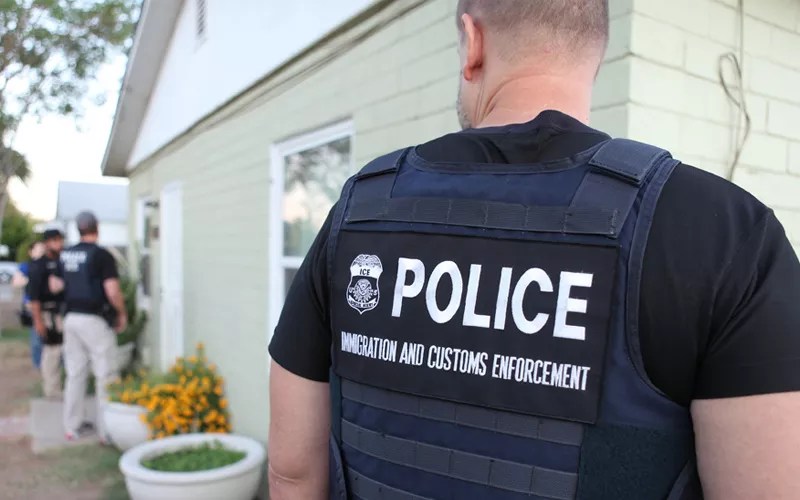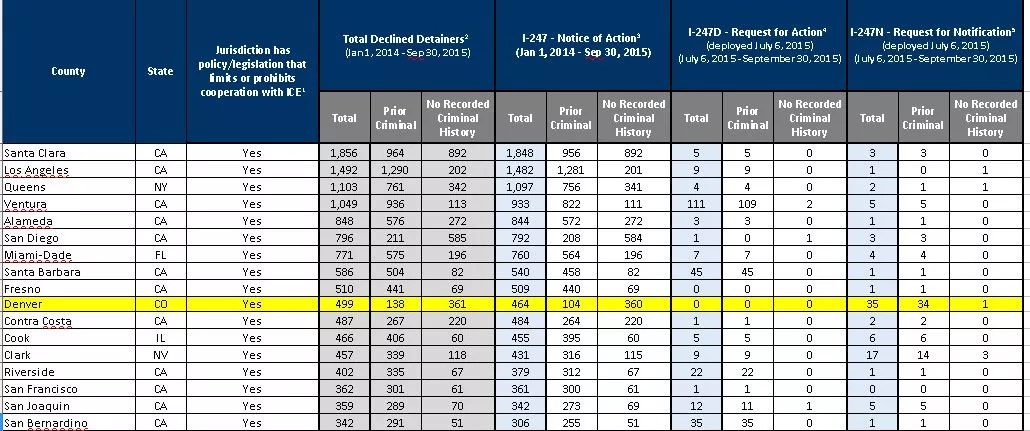
By U.S. Immigration and Customs Enforcement (Department of Homeland Security) [Public domain], via Wikimedia Commons

Audio By Carbonatix
Five days into his administration, President Donald Trump issued an executive order that threatens to pull federal funding from so-called sanctuary cities that shield undocumented immigrants.
The order has worried communities across the country. Some cities like Chicago, Boston and New York responded by defiantly declaring themselves sanctuary cities in the face of the new administration. On Tuesday, January 31, San Francisco went even further, filing a lawsuit challenging the president and his executive order.
Denver’s position is not as clear-cut. While Mayor Michael Hancock and the Denver Police Department have both stated that they will not go out of their way to enforce immigration laws on behalf of the federal government, Denver has not formally declared itself a sanctuary city. On January 25, the day that the executive order was signed, Hancock appeared to settle the issue by saying, “We’re not a sanctuary city.” But two days later, he backpedaled in a video he posted to YouTube, saying, “If being a sanctuary city means that we value taking care of one another, and welcoming refugees and immigrants, then I welcome the title.”
The nuanced and shifting language has not reassured many Denver residents. After the Colorado Latino Forum scheduled a public discussion about the topic for February 2, it has had to change locations twice because so many people have said they want to come. The event is now set for 5:30 p.m. tonight, February 2, at North High School. Over 3,000 people on Facebook say they are “interested” or are going to the event (which Westword will cover). Mayor Hancock will not be there because of scheduling conflicts, but Chief of Staff Alan Salazar and Deputy City Attorney Cristal DeHerrera will be there.
Much of the confusion over sanctuary cities stems from the government’s lack of a legal definition. One of the most widely circulated interpretations of the term was put forward in 2009 by the Library of Congress’s Congressional Research Service, which defined a sanctuary city as a locality that “as a result of a state or local act, ordinance, policy, or fiscal constraints, place[s] limits on their assistance to federal immigration authorities seeking to apprehend and remove unauthorized aliens.”
Hancock has said that city attorneys do not believe Denver is in violation of the president’s executive order. His office provided Westword with a full analysis by assistant city attorney David Broadwell, who notes that Trump’s order contains multiple and conflicting interpretations of what it calls “sanctuary jurisdictions.” Broadwell’s full memo is posted at the bottom of this article.
Still, reports from Immigration and Customs Enforcement (ICE) and the Department of Homeland Security (DHS) show that Denver engages in at least one practice cited in Trump’s order as being in line with a sanctuary jurisdiction.
Since 2014, ICE has been keeping records of “declined detainers,” meaning the number of times that jails at the city and county levels refused to hold undocumented immigrants for an extra 48 hours until ICE could process them and potentially take them into custody. Currently, it is not illegal for a county like Denver to ignore requests from the feds to hold onto undocumented immigrants unless presented with a warrant.
Amber Miller, communications director for Mayor Hancock, says that Denver relies on a federal court ruling from 2014 that defends cities from having to hold inmates for immigration detainers.
But Trump’s executive order specifically says that the federal government will now be keeping tabs on “sanctuary jurisdictions” by looking at ICE’s Declined Detainer reports:
To better inform the public regarding the public safety threats associated with sanctuary jurisdictions, the Secretary [of Homeland Security] shall utilize the Declined Detainer Outcome Report or its equivalent and, on a weekly basis, make public a comprehensive list of criminal actions committed by aliens and any jurisdiction that ignored or otherwise failed to honor any detainers with respect to such aliens.
In the most recent 2016 ICE declined detainer report, Denver is listed as a county that “has policy/legislation that limits or prohibits cooperation with ICE.”
It shows that between January 1, 2014, and September 30, 2015, Denver County had 499 declined detainers – the tenth-highest number in the nation.

There are 506 counties, including Denver, listed on the Declined Detainer report
ICE
In another 2014 DHS report, Denver County is listed as a jurisdiction that “will not honor ICE detainer unless accompanied by a criminal warrant.”
Trump’s executive order suggests that the Department of Homeland Security begin posting this data weekly.
“Posting the [declined] detainers is in our view an act of bullying and trying to push us to act unconstitutionally,” Miller responds. “We’re not going to do that. The mayor has said that from day one of being in office.”
Below is Denver’s legal analysis of the Trump order:
Immigration.trump Sanctuary XO.memo on Scribd